2023年中考英语语法复习之系列-动词与情态动词课件(共59张PPT)
文档属性
| 名称 | 2023年中考英语语法复习之系列-动词与情态动词课件(共59张PPT) | 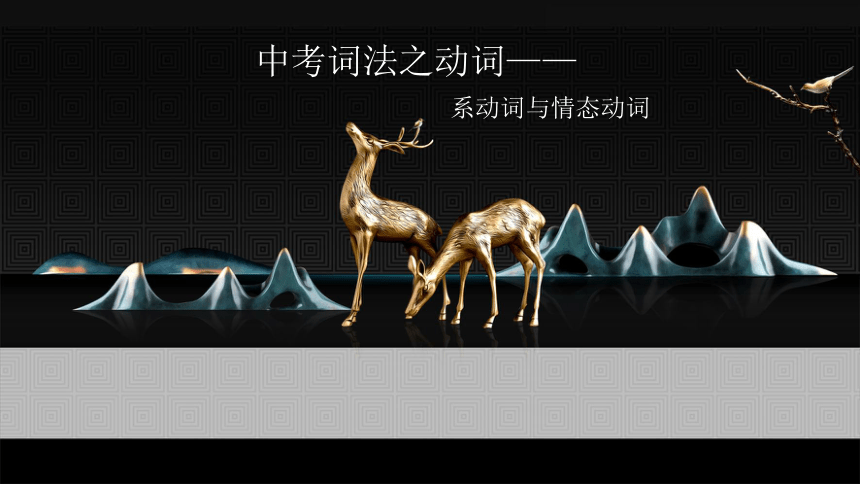 | |
| 格式 | pptx | ||
| 文件大小 | 2.4MB | ||
| 资源类型 | 教案 | ||
| 版本资源 | 人教新目标(Go for it)版 | ||
| 科目 | 英语 | ||
| 更新时间 | 2022-08-04 21:13:19 | ||
图片预览

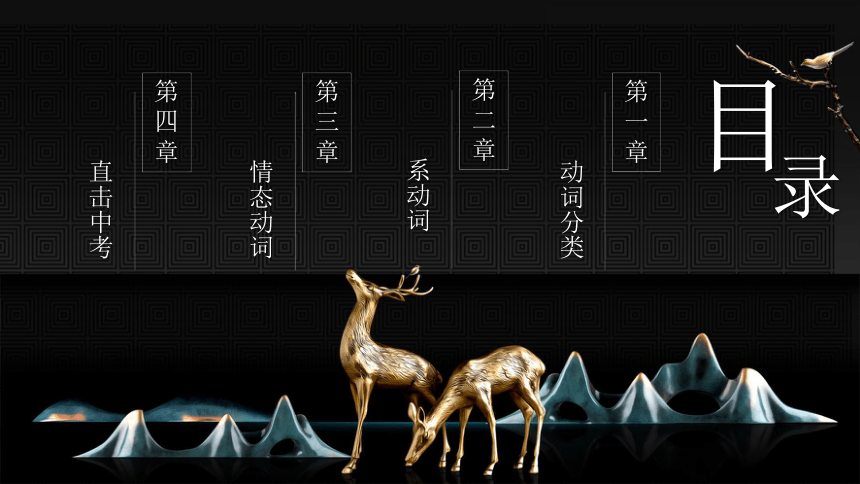
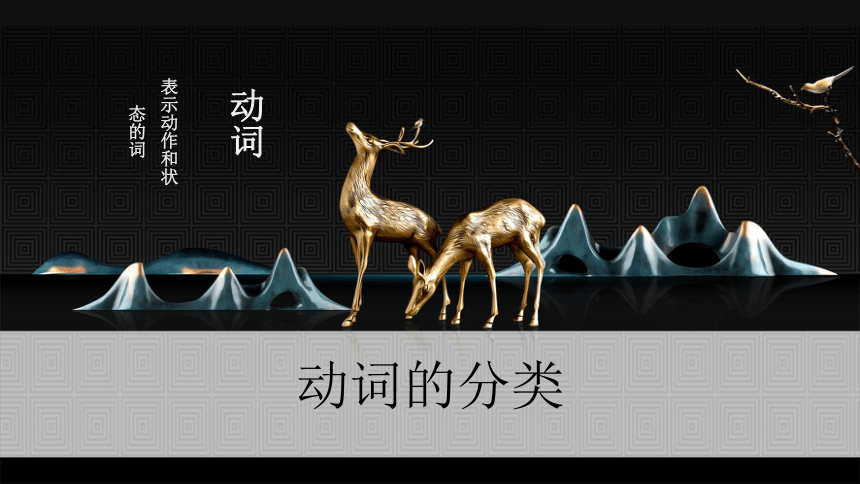
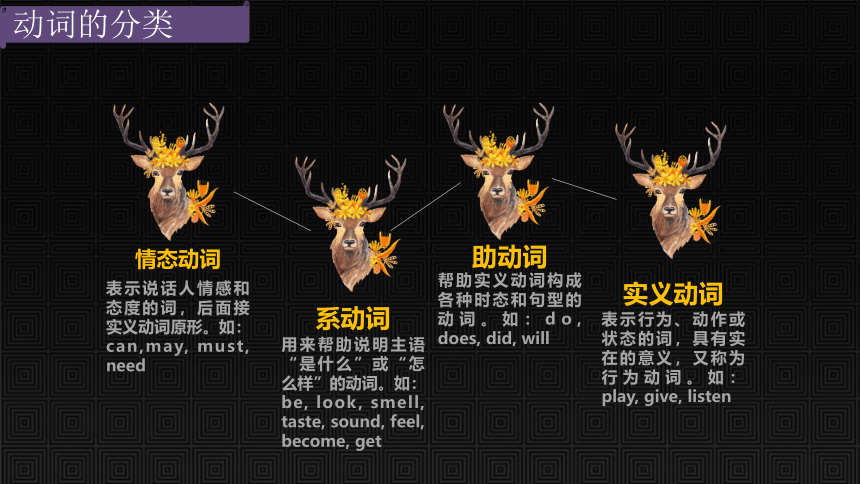
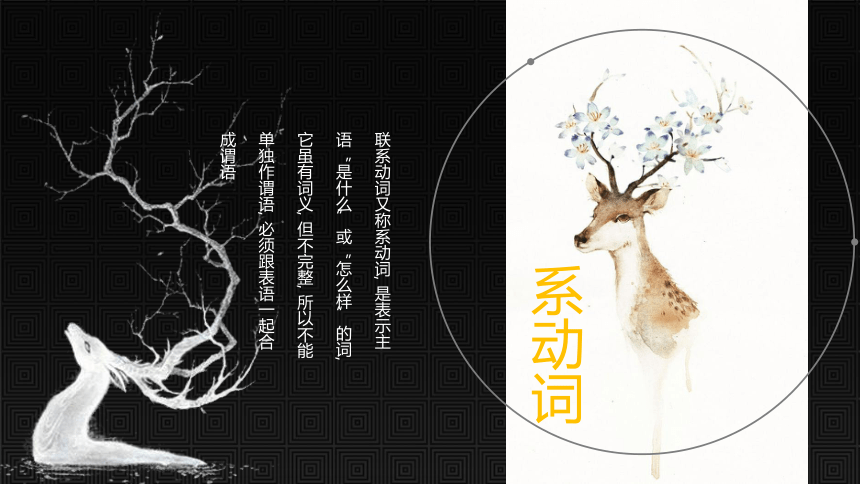
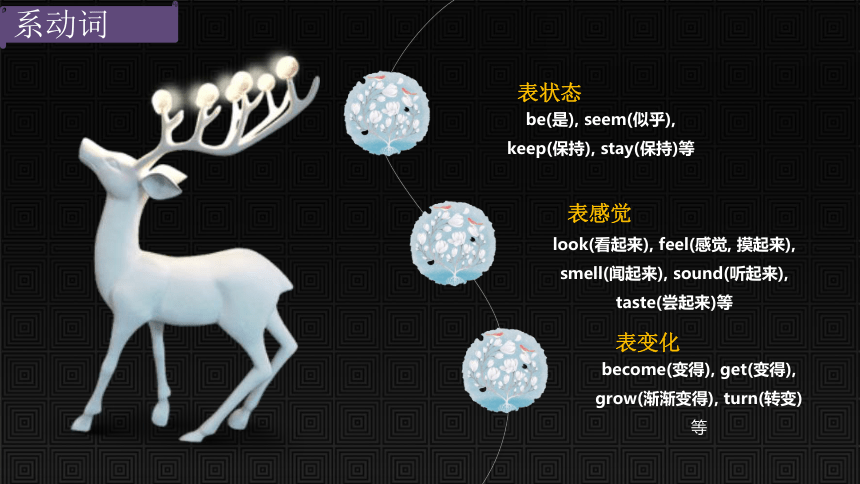
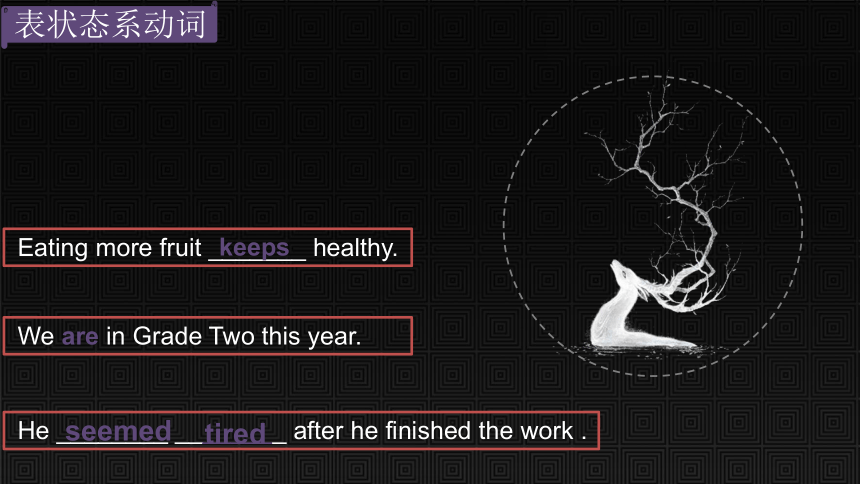
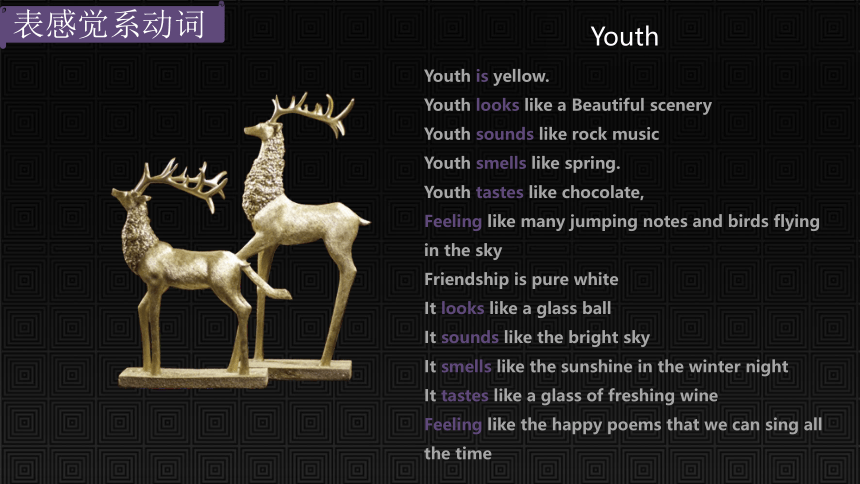
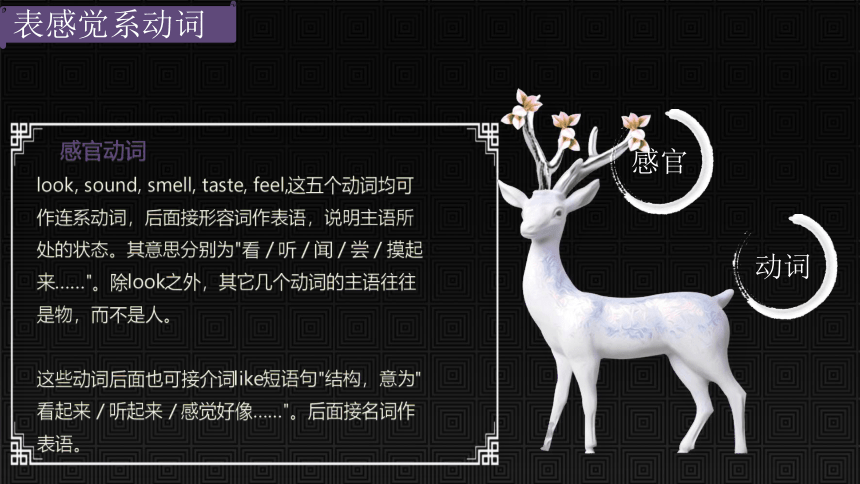
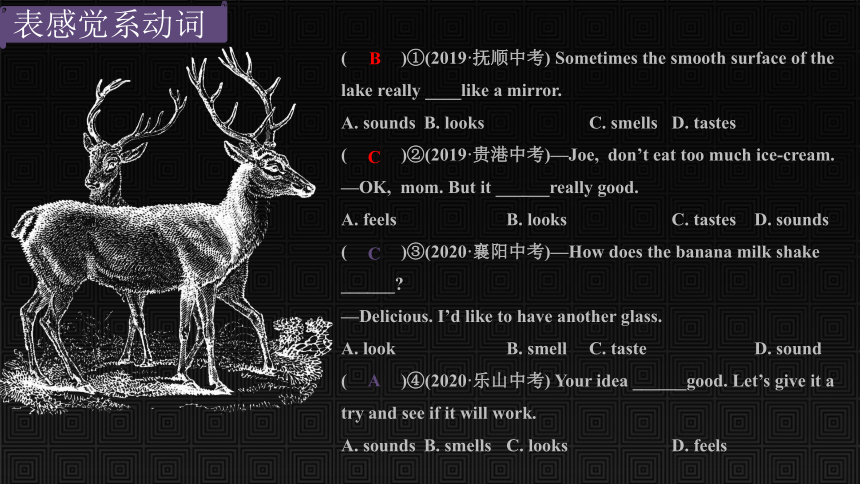
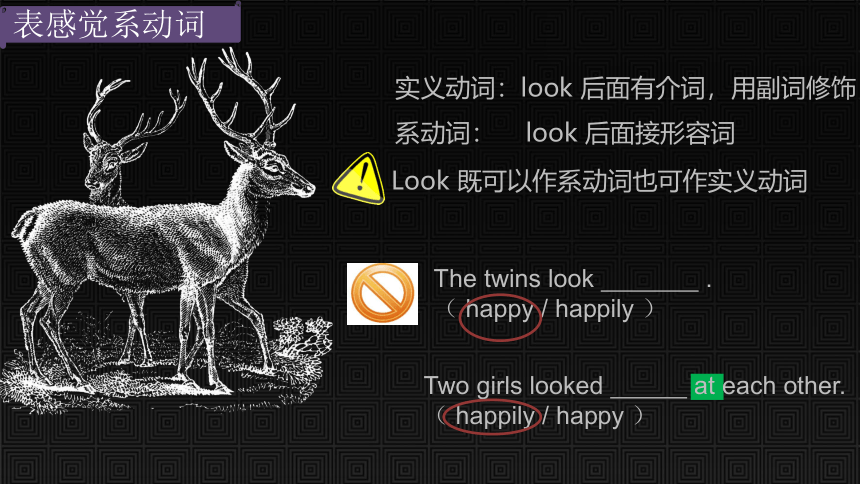
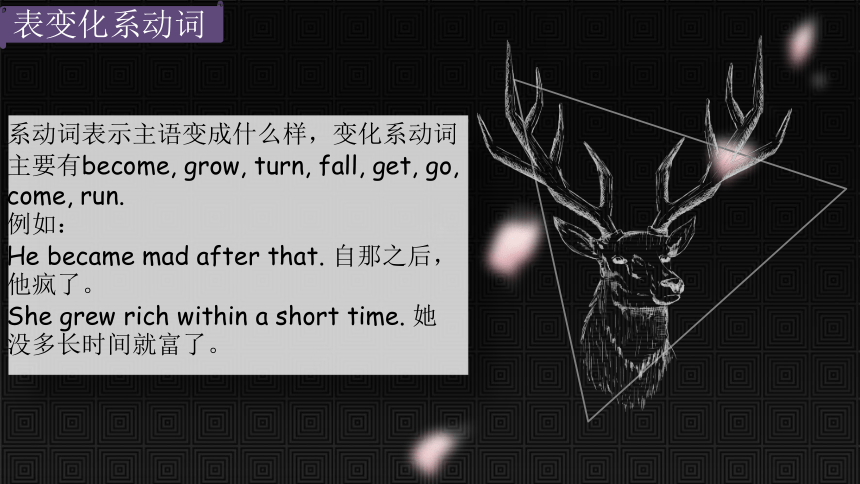
文档简介
(共58张PPT)
中考词法之动词——
系动词与情态动词
录
目
第一章
动词分类
第二章
系动词
第三章
情态动词
第四章
直击中考
动词的分类
动词
表示动作和状态的词
情态动词
表示说话人情感和态度的词,后面接实义动词原形。如:can,may, must, need
系动词
用来帮助说明主语“是什么”或“怎么样”的动词。如:be, look, smell, taste, sound, feel, become, get
助动词
帮助实义动词构成各种时态和句型的动词。如:do, does, did, will
实义动词
表示行为、动作或状态的词,具有实在的意义,又称为行为动词。如:play, give, listen
动词的分类
系动词
联系动词又称系动词, 是表示主语“是什么”或“怎么样”的词, 它虽有词义, 但不完整, 所以不能单独作谓语, 必须跟表语一起合成谓语
表状态
be(是), seem(似乎), keep(保持), stay(保持)等
表感觉
look(看起来), feel(感觉, 摸起来), smell(闻起来), sound(听起来), taste(尝起来)等
表变化
become(变得), get(变得), grow(渐渐变得), turn(转变)等
系动词
表状态系动词
Eating more fruit _______ healthy.
keeps
He ________ ________ after he finished the work .
seemed
tired
We are in Grade Two this year.
Youth is yellow.
Youth looks like a Beautiful scenery
Youth sounds like rock music
Youth smells like spring.
Youth tastes like chocolate,
Feeling like many jumping notes and birds flying in the sky
Friendship is pure white
It looks like a glass ball
It sounds like the bright sky
It smells like the sunshine in the winter night
It tastes like a glass of freshing wine
Feeling like the happy poems that we can sing all the time
Youth
表感觉系动词
感官动词
look, sound, smell, taste, feel,这五个动词均可作连系动词,后面接形容词作表语,说明主语所处的状态。其意思分别为"看 / 听 / 闻 / 尝 / 摸起来……"。除look之外,其它几个动词的主语往往是物,而不是人。
这些动词后面也可接介词like短语句"结构,意为"看起来 / 听起来 / 感觉好像……"。后面接名词作表语。
感官
动词
表感觉系动词
( )①(2019·抚顺中考) Sometimes the smooth surface of the lake really ____like a mirror.
A. sounds B. looks C. smells D. tastes
( )②(2019·贵港中考)—Joe, don’t eat too much ice-cream.
—OK, mom. But it ______really good.
A. feels B. looks C. tastes D. sounds
( )③(2020·襄阳中考)—How does the banana milk shake ______
—Delicious. I’d like to have another glass.
A. look B. smell C. taste D. sound
( )④(2020·乐山中考) Your idea ______good. Let’s give it a try and see if it will work.
A. sounds B. smells C. looks D. feels
B
C
C
A
表感觉系动词
Look 既可以作系动词也可作实义动词
The twins look .
( happy / happily )
Two girls looked at each other.
( happily / happy )
实义动词:look 后面有介词,用副词修饰
系动词: look 后面接形容词
表感觉系动词
表变化系动词
系动词表示主语变成什么样,变化系动词主要有become, grow, turn, fall, get, go, come, run.
例如:
He became mad after that. 自那之后,他疯了。
She grew rich within a short time. 她没多长时间就富了。
1. 凡是变坏,往往用go
如:go bad, go mad, go crazy, go wrong,
go sour, go deaf
2. 习惯上用turn表示颜色的变化
如:turn red, turn yellow, turn green
3. 夜短日长的变化用get
如:The days get longer and nights get shorter.
It was getting dark.
4. 谈职业时,多用become
如:become a teacher, become a writer
谈变化的词--go, turn, get, become的用法区别:
表变化系动词
In winter the days _______ colder and colder.
A. turn
B. grow
C. go
D. get
Have a try
表变化系动词
His face _______ pale(苍白的) at that time.
A. got
B. looked
C. turned
D. seemed
系动词Summary
sound
smell
taste
look
feel
get/ become
身体/天气
go
变坏
come
变好
turn
颜色
grow
逐渐变化
stay/ keep/
remain
保持
系动词练习
1.— How do you like the fish I cooked for you
— I haven’t had it yet. However, it _______ delicious.
A.feels B.is felt C.is smelt D.smells
3.After the terrible accident, the man _______ mad.
And the news _______ a bomb to his parents.
A.went; sounded B.went; sounded like
C.came; sounded like D.came; sounded
4.These chocolate biscuits taste _______ and sell _______.
A.good; well B.well; well
C.good; good D.well; good
sound like + n. (听起来像)
类似:look like + n.(看起来像)
taste + adj.
V系+ adj.
V系+ adj.
sell(V. 卖) + adv.
系动词练习
2. If you don’t put the fish in the fridge, it will ________ soon in such hot weather.
A.go bad B.go badly
C.come bad D.come badly
意思是“变坏”
go + adj.“变坏”(go bad) VS come + adj.“变好”(come true)
5. When Nancy and Tina were told the coming trip to Swiss, the two girls looked _______ and they looked _______ at their parents.
A.happy; happy B.happily; happy
C.happily; happily D.happy; happily
look 系动词 +adj.(看起来)
look at 动词短语 +adv. (看着)
情态动词
情态动词是一种本身有一定的词义,表示说话人的情绪、态度或语气的动词,但不能单独作谓语,只能和其他动词原形构成谓语。
表达情感和态度的工具,动词的“铁哥儿们”,不能单独使用,后加动词原形联合做谓语。
Form: 没有人称和数的变化
情态动词后面接动词原形
一般疑问句往主语前面提,变否定 情态动词后加not
Function: 1.表达可能、建议、愿望、必要、允许、能力……
2.表示一种推断。
常考的情态动词:
1.Can could
2. Must 3.May might
4. Should 5.Will would
6.Need 7. Had better not
情态动词
can和could
can表示能力,“能,会”。could表能力是can的过去式。
表示请求或允许,此时could不是can的过去式。=may。
can't不可能 ,否定式表推测。
I can play soccer. He can sing and dance.
Can(could) I sit here
He can't be in the library. I saw him have lunch in the classroom
can
could
can和could
Can could
(could 表示请求时,could 比can 委婉)
can/could
can/could
表示请求、允许,“可以”
Can I use your telephone
---Could you lend your car to me
---Of course, I can.
can和be able to
can只有一般现在时(can)和一般过去时(could)
be able to有现在时、过去时、将来时
Jim couldn't speak English last year. But now he can.
We were not able to finish all work yesterday. But we will be able to finish it next week.
could也表示提出委婉的请求,在回答中不可用could。
--- Could I turn the television on
--- Yes, you can. / No, you can't.
( )(2020·呼和浩特中考) He ______ sleep, although he tried to. One cup
of coffee in the late afternoon caused him to stay awake almost all night.
A. wouldn’t B. shouldn’t
C. couldn’t D. mustn’t
C
( )(2020·铜仁中考) —How delicious the meal is! Did Kangkang’s mother cook it
—It ______be her. These days she has been in a poor village to help the people
there.
A. can’t B. won’t
C. mustn’t D. needn’t
A
must和have to
have/has to有人称、数、时态的变化,而must 没有。
I lost my way yesterday. I had to call the police for help.
主观
客观
must强调主观意愿
have to强调客观需要
We must study hard at school.
The sun is setting and I have to go home.
must
1
2
3
必须,表达主观愿望
以must开头的疑问句,肯定回答用must,而否定回答则用needn't或don't have to,意为”不需要、不必”,而不能用mustn't。
I must go to school.
区别:I have to go to school .(被迫)
Must I finish the homework now
A: Yes, you mustn B: No, you needn’t.
You mustn’t take photos in the museum.
Mustn’t 表禁止
表推测用法,用于肯定句,
表示一种肯定的推测,有把握。
The hair band must belong to a girl.
( )(2020·龙东中考)—Mum, _______I do my homework tonight
—No, you _______. But you must finish it before Sunday.
A. need; mustn’t B. must; needn’t
C. must; mustn’t
B
must
( )(2020·铜仁中考) —How delicious the meal is! Did Kangkang’s mother cook it
—It ______be her. These days she has been in a poor village to help the people
there.
A. can’t B. won’t
C. mustn’t D. needn’t
A
must
( )6. Oil is everywhere in this store, so you ________ know smoking is not allowed here.
A. can B. may
C. must D. need
C
must
may和might
may
might
表示请求、允许,“可以”
表示推测,意为“可能、也许”
表示祝愿
You may go home now.
---May I go now
---No, you mustn’t/can't.
He may be at home.
They might come tomorrow.
May your dream come true.
may和might
may表示允许或请求,表示没有把握的推测。
有一般现在时(may)和一般过去时(might)。
might 也可以表示推测,不表示时态。可能性比may 小。
She might throw your clothes away yesterday. But she may buy you some new clothes today.
He might be at home.
may和might
maybe副词,“大概,也许”。常放在句首。
may be是“情态动词+动词原形”。放在句中。
Maybe you put your keys in your pocket.
He may be at home now.
( )—We can see some wild animals in the forest, right
—It's hard to say. There be only a few left.
A.may B.most
C.need D.should
A
may和might
( )—Are you going to write her a letter to say sorry
—I , but that depends.
A.might
B.need
C.should
A
may和might
( )(2020怀化,24)—Where's Jane
—I'm not sure. She in the library.
A.may be
B.must be
C.can't be
A
may和might
will和would
will
would
will表示请求、询问或意愿
would用来表示过去的意愿或委婉的询问
Will you help me with my English
Would you like to come to my party
否定形式为won’t
wouldn’t
( )He has broken his promises so many times. We ________ trust him anymore.
A. needn’t B. won’t
C. shouldn’t D. couldn’t
C
will和would
( )——Honey, will you stay home before I return
——I _______, mum.
A. can B. must
C. will D. should
C
will和would
其他情态动词
shall
should
shall用于第一人称,表示征求对方意见
Shall I open the window
Shall we have lunch at a restaurant
should 用来表示义务、责任,意为“应该”
The children should listen to their parents.
其他情态动词had betterhad better do sth.最好做某事You had better come back early.had better not do sth.最好做某事You had better not take off your coat.多用于第二人称多用于第二人称其他情态动词needneed作情态动词,用于否定句和疑问句中,用need提问时,肯定回答用must,否定回答用needn’t--Need I come here tomorrow ---Yes, you must / No, you needn’t (don’t have to).need作行为动词,构成否定句和疑问句时要用助动词do, does, didThe work needs a lot of people.You don't need to go too early.( )Don’t be upset! You ________ cheer up and try it one more time.
A. might B. should
C. could D. would
B
其它情态动词
( )Respecting parents and teachers is a kind of good action. We ________ talk back to them.
A. can’t B. mustn’t
C. needn’t D. shouldn’t
D
其它情态动词
( )(2020湘潭,28)I take too much money with me. I like to pay by the mobile phone.
A.mustn't
B.shouldn't
C.needn't
C
其它情态动词
( )(2020湖北武汉,35)—I don't care what people think.
—Well,you .Some opinions are worth weighing.
A.might B.should
C.could D.would
B
其它情态动词
情态动词 含义及用法 例句
can 表示能力,意为“能,会”。可与be able to 相互转化。 Linda can/is able to speak Chinese smoothly.
表示请求、允许,意为“可以”。 Can we bring music players to school?[人教七(全) Unit 4 P20]
can’t 表示能力,意为“不能,不会”。 I can’t spell the English word.
表示拒绝对方的请求或者不同意/不允许,意为“不可以”。 —Can I park here
—Sorry, I am afraid you can’t.
情态动词汇总
情态动词 含义及用法 例句
could can的过去式,意为“能,会”,表示过去的能力。 He couldn’t find his keys yesterday morning.
在疑问句中表示委婉的请求。 Could you take a message for me
couldn’t could的否定式,意为“不能,不会”。 The little girl couldn’t dress herself.
must 表示主观看法,意为“必须,一定”。 We must be there on time.
情态动词汇总
情态动词 含义及用法 例句
mustn’t must的否定式,意为“一定不要,禁止”。 You mustn’t be late for class tomorrow.
表示请求、许可,意为“可以”。 May I sit here
may 用于祈使句,表示祝福和祝愿,用法和wish相似。 May your dream come true.
might 表示请求、许可,语气比may更委婉。(may的过去式) Might I ask you a question
need 表示“必须;需要”,主要用于否定句和疑问句中 Need I do it now
情态动词汇总
情态动词 含义及用法 例句
needn’t 意为“不需要,没必要”。 —Must I pay for the book in advance
—No, you needn’t.
意为“应该”,表示要求和命令,也可以表示劝告或建议。 We should work harder to protect our world. [外研八(上)Module 10 P87]
should 表示征询意见,常用于疑问句中。 When should we begin our discussion
shouldn’t 意为“不应该”。 We shouldn’t throw rubbish everywhere.
情态动词汇总
情态动词 含义及用法 例句
had better 意为“最好”。多用于第二人称,否定形式为had better not。 It is raining heavily. You had better stay at home.
have to 意为“不得不”,多表示客观必要。 I have to prepare for the exam.
don’t have to 意为“不需要”,回答用must提问的问句。 —Must we finish the task now
—No, we don't have to.
情态动词汇总
直击中考
直击中考
用 taste, become, seem, appear, remain 的适当形式填空。
1. She ________ a famous nurse.
2. The village _________ deserted and not even a dog
was to be seen.
3. The pie ______ delicious. I want to eat another one.
4. The news of our trip must _______ a secret for a little
while.
5. The idea of writing down her memories of him______ a good one.
became
appeared
tastes
seems
remain
直击中考
( )(2019·抚顺) Sometimes the smooth surface of the lake really ____like a mirror.
A. sounds B. looks C. smells D. tastes
( )(2019·贵港)—Joe, don’t eat too much ice-cream.
—OK, mom. But it ______really good.
A. feels B. looks C. tastes D. sounds
( )(2020·襄阳)—How does the banana milk shake ______
—Delicious. I’d like to have another glass.
A. look B. smell C. taste D. sound
B
C
C
直击中考
( )2016天津 ---Would you like to try some pizza
--- Yes,please. It lovely and nice.
A. becomes B. tastes C. sounds D. feels
( )--- Do you like swimming in winter
--- Of course. The water cold at first , but then I am warm and fullof energy.
A. feels B. tastes C. smells D. look
( )--- 3D printing could be used to build
a house in less than 24 hours.
--- It amazing. It's my first time to get to know this.
A. sounds B. smells C. tastes D. feels
B
A
A
直击中考
二、用适当的情态动词填空
1. We __________finish the work today because we have something else to do tomorrow.
2. —Look at the young woman in blue. Is it Mrs Li
—No. It __________be her. She is wearing a white dress today.
3. —Many people play with mobile phones all day instead of reading books.
—That’s too bad. Everyone __________be a book lover. Reading is more enjoyable.
4. —What will the weather be like tomorrow
—It __________be rainy, cloudy or sunny. Who knows
must
can’t
should
might
直击中考
( )(2020江苏苏州,6)—Mum, why do I have to wash hands so many times a day
—For your health, you be too careful.
A.can’t B.shouldn’t C.mustn’t D.needn’t
( )(2020贵州贵阳,42)With the help of Air Classroom, students keep learning even with schools closed.
A.can B.must C.should
( )(2020山东青岛,9)—Allen,shall we go to the bookstore this afternoon
—I’m sorry, David, but I meet my cousin at the train station. A.have to B.can C.may D.could
A
A
A
直击中考
( )(2020湖北黄冈,28)—Is this blue schoolbag Lucy’s
—No. It be hers. Her schoolbag is pink.
A.must B.mustn’t C.can’t D.may
( )(2020江苏南京,5)By the time she was eight, Linda read English and French.
A.could B.must C.need D.may
( )(2019河南,31)Jerry didn't pay me back, but he promised that he this Sunday.
A.must B.could C.would D.should
C
A
C
谢谢观看
中考词法之动词——
系动词与情态动词
录
目
第一章
动词分类
第二章
系动词
第三章
情态动词
第四章
直击中考
动词的分类
动词
表示动作和状态的词
情态动词
表示说话人情感和态度的词,后面接实义动词原形。如:can,may, must, need
系动词
用来帮助说明主语“是什么”或“怎么样”的动词。如:be, look, smell, taste, sound, feel, become, get
助动词
帮助实义动词构成各种时态和句型的动词。如:do, does, did, will
实义动词
表示行为、动作或状态的词,具有实在的意义,又称为行为动词。如:play, give, listen
动词的分类
系动词
联系动词又称系动词, 是表示主语“是什么”或“怎么样”的词, 它虽有词义, 但不完整, 所以不能单独作谓语, 必须跟表语一起合成谓语
表状态
be(是), seem(似乎), keep(保持), stay(保持)等
表感觉
look(看起来), feel(感觉, 摸起来), smell(闻起来), sound(听起来), taste(尝起来)等
表变化
become(变得), get(变得), grow(渐渐变得), turn(转变)等
系动词
表状态系动词
Eating more fruit _______ healthy.
keeps
He ________ ________ after he finished the work .
seemed
tired
We are in Grade Two this year.
Youth is yellow.
Youth looks like a Beautiful scenery
Youth sounds like rock music
Youth smells like spring.
Youth tastes like chocolate,
Feeling like many jumping notes and birds flying in the sky
Friendship is pure white
It looks like a glass ball
It sounds like the bright sky
It smells like the sunshine in the winter night
It tastes like a glass of freshing wine
Feeling like the happy poems that we can sing all the time
Youth
表感觉系动词
感官动词
look, sound, smell, taste, feel,这五个动词均可作连系动词,后面接形容词作表语,说明主语所处的状态。其意思分别为"看 / 听 / 闻 / 尝 / 摸起来……"。除look之外,其它几个动词的主语往往是物,而不是人。
这些动词后面也可接介词like短语句"结构,意为"看起来 / 听起来 / 感觉好像……"。后面接名词作表语。
感官
动词
表感觉系动词
( )①(2019·抚顺中考) Sometimes the smooth surface of the lake really ____like a mirror.
A. sounds B. looks C. smells D. tastes
( )②(2019·贵港中考)—Joe, don’t eat too much ice-cream.
—OK, mom. But it ______really good.
A. feels B. looks C. tastes D. sounds
( )③(2020·襄阳中考)—How does the banana milk shake ______
—Delicious. I’d like to have another glass.
A. look B. smell C. taste D. sound
( )④(2020·乐山中考) Your idea ______good. Let’s give it a try and see if it will work.
A. sounds B. smells C. looks D. feels
B
C
C
A
表感觉系动词
Look 既可以作系动词也可作实义动词
The twins look .
( happy / happily )
Two girls looked at each other.
( happily / happy )
实义动词:look 后面有介词,用副词修饰
系动词: look 后面接形容词
表感觉系动词
表变化系动词
系动词表示主语变成什么样,变化系动词主要有become, grow, turn, fall, get, go, come, run.
例如:
He became mad after that. 自那之后,他疯了。
She grew rich within a short time. 她没多长时间就富了。
1. 凡是变坏,往往用go
如:go bad, go mad, go crazy, go wrong,
go sour, go deaf
2. 习惯上用turn表示颜色的变化
如:turn red, turn yellow, turn green
3. 夜短日长的变化用get
如:The days get longer and nights get shorter.
It was getting dark.
4. 谈职业时,多用become
如:become a teacher, become a writer
谈变化的词--go, turn, get, become的用法区别:
表变化系动词
In winter the days _______ colder and colder.
A. turn
B. grow
C. go
D. get
Have a try
表变化系动词
His face _______ pale(苍白的) at that time.
A. got
B. looked
C. turned
D. seemed
系动词Summary
sound
smell
taste
look
feel
get/ become
身体/天气
go
变坏
come
变好
turn
颜色
grow
逐渐变化
stay/ keep/
remain
保持
系动词练习
1.— How do you like the fish I cooked for you
— I haven’t had it yet. However, it _______ delicious.
A.feels B.is felt C.is smelt D.smells
3.After the terrible accident, the man _______ mad.
And the news _______ a bomb to his parents.
A.went; sounded B.went; sounded like
C.came; sounded like D.came; sounded
4.These chocolate biscuits taste _______ and sell _______.
A.good; well B.well; well
C.good; good D.well; good
sound like + n. (听起来像)
类似:look like + n.(看起来像)
taste + adj.
V系+ adj.
V系+ adj.
sell(V. 卖) + adv.
系动词练习
2. If you don’t put the fish in the fridge, it will ________ soon in such hot weather.
A.go bad B.go badly
C.come bad D.come badly
意思是“变坏”
go + adj.“变坏”(go bad) VS come + adj.“变好”(come true)
5. When Nancy and Tina were told the coming trip to Swiss, the two girls looked _______ and they looked _______ at their parents.
A.happy; happy B.happily; happy
C.happily; happily D.happy; happily
look 系动词 +adj.(看起来)
look at 动词短语 +adv. (看着)
情态动词
情态动词是一种本身有一定的词义,表示说话人的情绪、态度或语气的动词,但不能单独作谓语,只能和其他动词原形构成谓语。
表达情感和态度的工具,动词的“铁哥儿们”,不能单独使用,后加动词原形联合做谓语。
Form: 没有人称和数的变化
情态动词后面接动词原形
一般疑问句往主语前面提,变否定 情态动词后加not
Function: 1.表达可能、建议、愿望、必要、允许、能力……
2.表示一种推断。
常考的情态动词:
1.Can could
2. Must 3.May might
4. Should 5.Will would
6.Need 7. Had better not
情态动词
can和could
can表示能力,“能,会”。could表能力是can的过去式。
表示请求或允许,此时could不是can的过去式。=may。
can't不可能 ,否定式表推测。
I can play soccer. He can sing and dance.
Can(could) I sit here
He can't be in the library. I saw him have lunch in the classroom
can
could
can和could
Can could
(could 表示请求时,could 比can 委婉)
can/could
can/could
表示请求、允许,“可以”
Can I use your telephone
---Could you lend your car to me
---Of course, I can.
can和be able to
can只有一般现在时(can)和一般过去时(could)
be able to有现在时、过去时、将来时
Jim couldn't speak English last year. But now he can.
We were not able to finish all work yesterday. But we will be able to finish it next week.
could也表示提出委婉的请求,在回答中不可用could。
--- Could I turn the television on
--- Yes, you can. / No, you can't.
( )(2020·呼和浩特中考) He ______ sleep, although he tried to. One cup
of coffee in the late afternoon caused him to stay awake almost all night.
A. wouldn’t B. shouldn’t
C. couldn’t D. mustn’t
C
( )(2020·铜仁中考) —How delicious the meal is! Did Kangkang’s mother cook it
—It ______be her. These days she has been in a poor village to help the people
there.
A. can’t B. won’t
C. mustn’t D. needn’t
A
must和have to
have/has to有人称、数、时态的变化,而must 没有。
I lost my way yesterday. I had to call the police for help.
主观
客观
must强调主观意愿
have to强调客观需要
We must study hard at school.
The sun is setting and I have to go home.
must
1
2
3
必须,表达主观愿望
以must开头的疑问句,肯定回答用must,而否定回答则用needn't或don't have to,意为”不需要、不必”,而不能用mustn't。
I must go to school.
区别:I have to go to school .(被迫)
Must I finish the homework now
A: Yes, you mustn B: No, you needn’t.
You mustn’t take photos in the museum.
Mustn’t 表禁止
表推测用法,用于肯定句,
表示一种肯定的推测,有把握。
The hair band must belong to a girl.
( )(2020·龙东中考)—Mum, _______I do my homework tonight
—No, you _______. But you must finish it before Sunday.
A. need; mustn’t B. must; needn’t
C. must; mustn’t
B
must
( )(2020·铜仁中考) —How delicious the meal is! Did Kangkang’s mother cook it
—It ______be her. These days she has been in a poor village to help the people
there.
A. can’t B. won’t
C. mustn’t D. needn’t
A
must
( )6. Oil is everywhere in this store, so you ________ know smoking is not allowed here.
A. can B. may
C. must D. need
C
must
may和might
may
might
表示请求、允许,“可以”
表示推测,意为“可能、也许”
表示祝愿
You may go home now.
---May I go now
---No, you mustn’t/can't.
He may be at home.
They might come tomorrow.
May your dream come true.
may和might
may表示允许或请求,表示没有把握的推测。
有一般现在时(may)和一般过去时(might)。
might 也可以表示推测,不表示时态。可能性比may 小。
She might throw your clothes away yesterday. But she may buy you some new clothes today.
He might be at home.
may和might
maybe副词,“大概,也许”。常放在句首。
may be是“情态动词+动词原形”。放在句中。
Maybe you put your keys in your pocket.
He may be at home now.
( )—We can see some wild animals in the forest, right
—It's hard to say. There be only a few left.
A.may B.most
C.need D.should
A
may和might
( )—Are you going to write her a letter to say sorry
—I , but that depends.
A.might
B.need
C.should
A
may和might
( )(2020怀化,24)—Where's Jane
—I'm not sure. She in the library.
A.may be
B.must be
C.can't be
A
may和might
will和would
will
would
will表示请求、询问或意愿
would用来表示过去的意愿或委婉的询问
Will you help me with my English
Would you like to come to my party
否定形式为won’t
wouldn’t
( )He has broken his promises so many times. We ________ trust him anymore.
A. needn’t B. won’t
C. shouldn’t D. couldn’t
C
will和would
( )——Honey, will you stay home before I return
——I _______, mum.
A. can B. must
C. will D. should
C
will和would
其他情态动词
shall
should
shall用于第一人称,表示征求对方意见
Shall I open the window
Shall we have lunch at a restaurant
should 用来表示义务、责任,意为“应该”
The children should listen to their parents.
其他情态动词had betterhad better do sth.最好做某事You had better come back early.had better not do sth.最好做某事You had better not take off your coat.多用于第二人称多用于第二人称其他情态动词needneed作情态动词,用于否定句和疑问句中,用need提问时,肯定回答用must,否定回答用needn’t--Need I come here tomorrow ---Yes, you must / No, you needn’t (don’t have to).need作行为动词,构成否定句和疑问句时要用助动词do, does, didThe work needs a lot of people.You don't need to go too early.( )Don’t be upset! You ________ cheer up and try it one more time.
A. might B. should
C. could D. would
B
其它情态动词
( )Respecting parents and teachers is a kind of good action. We ________ talk back to them.
A. can’t B. mustn’t
C. needn’t D. shouldn’t
D
其它情态动词
( )(2020湘潭,28)I take too much money with me. I like to pay by the mobile phone.
A.mustn't
B.shouldn't
C.needn't
C
其它情态动词
( )(2020湖北武汉,35)—I don't care what people think.
—Well,you .Some opinions are worth weighing.
A.might B.should
C.could D.would
B
其它情态动词
情态动词 含义及用法 例句
can 表示能力,意为“能,会”。可与be able to 相互转化。 Linda can/is able to speak Chinese smoothly.
表示请求、允许,意为“可以”。 Can we bring music players to school?[人教七(全) Unit 4 P20]
can’t 表示能力,意为“不能,不会”。 I can’t spell the English word.
表示拒绝对方的请求或者不同意/不允许,意为“不可以”。 —Can I park here
—Sorry, I am afraid you can’t.
情态动词汇总
情态动词 含义及用法 例句
could can的过去式,意为“能,会”,表示过去的能力。 He couldn’t find his keys yesterday morning.
在疑问句中表示委婉的请求。 Could you take a message for me
couldn’t could的否定式,意为“不能,不会”。 The little girl couldn’t dress herself.
must 表示主观看法,意为“必须,一定”。 We must be there on time.
情态动词汇总
情态动词 含义及用法 例句
mustn’t must的否定式,意为“一定不要,禁止”。 You mustn’t be late for class tomorrow.
表示请求、许可,意为“可以”。 May I sit here
may 用于祈使句,表示祝福和祝愿,用法和wish相似。 May your dream come true.
might 表示请求、许可,语气比may更委婉。(may的过去式) Might I ask you a question
need 表示“必须;需要”,主要用于否定句和疑问句中 Need I do it now
情态动词汇总
情态动词 含义及用法 例句
needn’t 意为“不需要,没必要”。 —Must I pay for the book in advance
—No, you needn’t.
意为“应该”,表示要求和命令,也可以表示劝告或建议。 We should work harder to protect our world. [外研八(上)Module 10 P87]
should 表示征询意见,常用于疑问句中。 When should we begin our discussion
shouldn’t 意为“不应该”。 We shouldn’t throw rubbish everywhere.
情态动词汇总
情态动词 含义及用法 例句
had better 意为“最好”。多用于第二人称,否定形式为had better not。 It is raining heavily. You had better stay at home.
have to 意为“不得不”,多表示客观必要。 I have to prepare for the exam.
don’t have to 意为“不需要”,回答用must提问的问句。 —Must we finish the task now
—No, we don't have to.
情态动词汇总
直击中考
直击中考
用 taste, become, seem, appear, remain 的适当形式填空。
1. She ________ a famous nurse.
2. The village _________ deserted and not even a dog
was to be seen.
3. The pie ______ delicious. I want to eat another one.
4. The news of our trip must _______ a secret for a little
while.
5. The idea of writing down her memories of him______ a good one.
became
appeared
tastes
seems
remain
直击中考
( )(2019·抚顺) Sometimes the smooth surface of the lake really ____like a mirror.
A. sounds B. looks C. smells D. tastes
( )(2019·贵港)—Joe, don’t eat too much ice-cream.
—OK, mom. But it ______really good.
A. feels B. looks C. tastes D. sounds
( )(2020·襄阳)—How does the banana milk shake ______
—Delicious. I’d like to have another glass.
A. look B. smell C. taste D. sound
B
C
C
直击中考
( )2016天津 ---Would you like to try some pizza
--- Yes,please. It lovely and nice.
A. becomes B. tastes C. sounds D. feels
( )--- Do you like swimming in winter
--- Of course. The water cold at first , but then I am warm and fullof energy.
A. feels B. tastes C. smells D. look
( )--- 3D printing could be used to build
a house in less than 24 hours.
--- It amazing. It's my first time to get to know this.
A. sounds B. smells C. tastes D. feels
B
A
A
直击中考
二、用适当的情态动词填空
1. We __________finish the work today because we have something else to do tomorrow.
2. —Look at the young woman in blue. Is it Mrs Li
—No. It __________be her. She is wearing a white dress today.
3. —Many people play with mobile phones all day instead of reading books.
—That’s too bad. Everyone __________be a book lover. Reading is more enjoyable.
4. —What will the weather be like tomorrow
—It __________be rainy, cloudy or sunny. Who knows
must
can’t
should
might
直击中考
( )(2020江苏苏州,6)—Mum, why do I have to wash hands so many times a day
—For your health, you be too careful.
A.can’t B.shouldn’t C.mustn’t D.needn’t
( )(2020贵州贵阳,42)With the help of Air Classroom, students keep learning even with schools closed.
A.can B.must C.should
( )(2020山东青岛,9)—Allen,shall we go to the bookstore this afternoon
—I’m sorry, David, but I meet my cousin at the train station. A.have to B.can C.may D.could
A
A
A
直击中考
( )(2020湖北黄冈,28)—Is this blue schoolbag Lucy’s
—No. It be hers. Her schoolbag is pink.
A.must B.mustn’t C.can’t D.may
( )(2020江苏南京,5)By the time she was eight, Linda read English and French.
A.could B.must C.need D.may
( )(2019河南,31)Jerry didn't pay me back, but he promised that he this Sunday.
A.must B.could C.would D.should
C
A
C
谢谢观看
同课章节目录
- 词法
- 名词
- 动词和动词短语
- 动词语态
- 动词时态
- 助动词和情态动词
- 非谓语动词
- 冠词
- 代词
- 数词和量词
- 形容词副词及其比较等级
- 介词和介词短语
- 连词和感叹词
- 构词法
- 相似、相近词比较
- 句法
- 陈述句
- 一般疑问句和否定疑问句
- 特殊疑问句及选择疑问句
- 反意疑问句
- 存在句(There be句型)
- 宾语从句
- 定语从句
- 状语从句
- 主谓一致问题
- 简单句
- 并列句
- 复合句
- 主谓一致
- 主、表语从句
- 名词性从句
- 直接引语和间接引语
- 虚拟语气
- 感叹句
- 强调句
- 倒装句
- 祈使句
- 句子的成分
- 句子的分类
- 题型专区
- 单项选择部分
- 易错题
- 完形填空
- 阅读理解
- 词汇练习
- 听说训练
- 句型转换
- 补全对话
- 短文改错
- 翻译
- 书面表达
- 任务型阅读
- 语法填空
- 其他资料
